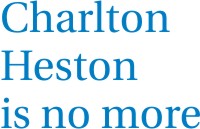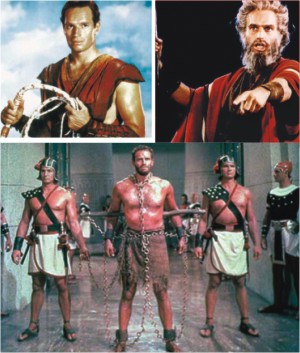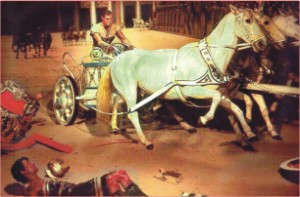Feature

Star Campus Desk
 NANCY Reagan was heartbroken over Charlton Heston's death. President Bush hailed him as a "strong advocate for liberty," while John McCain called Heston a devotee for civil and constitutional rights. NANCY Reagan was heartbroken over Charlton Heston's death. President Bush hailed him as a "strong advocate for liberty," while John McCain called Heston a devotee for civil and constitutional rights. Even Michael Moore, who mocked Heston in his gun-control documentary "Bowling for Columbine," posted the actor's picture on his Web site to mark his passing.
Heston, who died Saturday night at 84, was a towering figure both in his politics and on screen, where his characters had the ear of God (Moses in "The Ten Commandments"), survived apocalyptic plagues ("The Omega Man") and endured one of Hollywood's most-grueling action sequences (the chariot race in "Ben-Hur," which earned him the best-actor Academy Award).
Better known in recent years as a fierce gun-rights advocate who headed the National Rifle Association, Heston played legendary leaders and ordinary men hurled into heroic struggles.
"In taking on epic and commanding roles, he showed himself to be one of our nation's most gifted actors, and his legacy will forever be a part of our cinema," Republican presidential candidate McCain said in a statement that also noted Heston's involvement in the civil-rights movement and his stand against gun control.
Heston's jutting jaw, regal bearing and booming voice served him well as Marc Antony in "Julius Caesar" and "Antony and Cleopatra," Michelangelo in "The Agony and the Ecstasy," John the Baptist in "The Greatest Story Ever Told" and an astronaut on a topsy-turvy world where simians rule in "Planet of the Apes."
"Charlton Heston was seen by the world as larger than life," Heston's family said in a statement. "We knew him as an adoring husband, a kind and devoted father, and a gentle grandfather with an infectious sense of humor. He served these far greater roles with tremendous faith, courage and dignity."
The actor died at his home in Beverly Hills with his wife, Lydia, at his side. One of the biggest box-office draws of the 1950s, '60s and '70s, Heston's work dwindled largely to small parts and narration and other voice roles from the 1980s on, including an uncredited cameo as an ape in Tim Burton's 2001 remake of "Planet of the Apes."
Like fellow conservative Ronald Reagan, Heston served as president of the Screen Actors Guild. Former first lady Nancy Reagan said in a statement that she was heartbroken to hear of his death.
"He was one of Ronnie's and my dearest friends," she said. "I will never forget Chuck as a hero on the big screen in the roles he played, but more importantly I considered him a hero in life for the many times that he stepped up to support Ronnie in whatever he was doing."
Bush who in 2003 presented Heston the Presidential Medal of Freedom, the nation's highest civilian honor called Heston a "man of character and integrity, with a big heart."
Decades before his NRA leadership, Heston was a strong advocate for civil rights in the 1960s, joining marches and offering financial assistance.
Heston had contributed and raised thousands of dollars in Hollywood for Martin Luther King Jr.'s movement, said Earl Ofari Hutchinson, president of the Los Angeles Urban Policy Round Table.
Fans remember Heston for some of the most epic moments on film: Parting the Red Sea as Moses in "The Ten Commandments," cursing his self-destructive species as he stumbles on the remnants of the Statue of Liberty in "Planet of the Apes," tearing hell-bent through the chariot race in "Ben-Hur."
"Ben-Hur" earned 11 Oscars, the most ever until 1997's "Titanic" and 2003's "The Lord of the Rings: The Return of the King" tied it.
Born Charles Carter in a Chicago suburb on Oct. 4, 1923, Heston grew up in the Michigan wilderness, where his father operated a lumber mill.
 Heston took up acting after serving in the Army during World War II. He took his professional name from his mother's maiden name, Charlton, and the last name of his stepfather, Chester Heston, whom she married after his parents' divorce. Heston took up acting after serving in the Army during World War II. He took his professional name from his mother's maiden name, Charlton, and the last name of his stepfather, Chester Heston, whom she married after his parents' divorce.
After his movie debut in two independent films by a college classmate, Heston was put under contract by producer Hal B. Wallis ("Casablanca"). Cecil B. DeMille cast him as the circus manager in "The Greatest Show on Earth" and then as Moses in "The Ten Commandments."
He followed with Orson Welles' "Touch of Evil," William Wyler's "The Big Country" and the sea saga "The Wreck of the Mary Deare" before "Ben-Hur" elevated Heston to the top of Hollywood's A-list.
His later films included "Earthquake," "El Cid," "The Three Musketeers," "Midway" and "Soylent Green."
Heston and his wife had a daughter, Holly Ann, and a son, Fraser Clarke, who played the infant Moses in "The Ten Commandments."
In the 1990s, Heston's son directed his father in several TV and big-screen films, including "Treasure Island" and "Alaska." The Hestons celebrated their golden wedding anniversary in 1994 at a party with Hollywood and political friends. They had been married 64 years when he died.
(Excerpts from: MSN, LOS ANGELES -AP)
| 